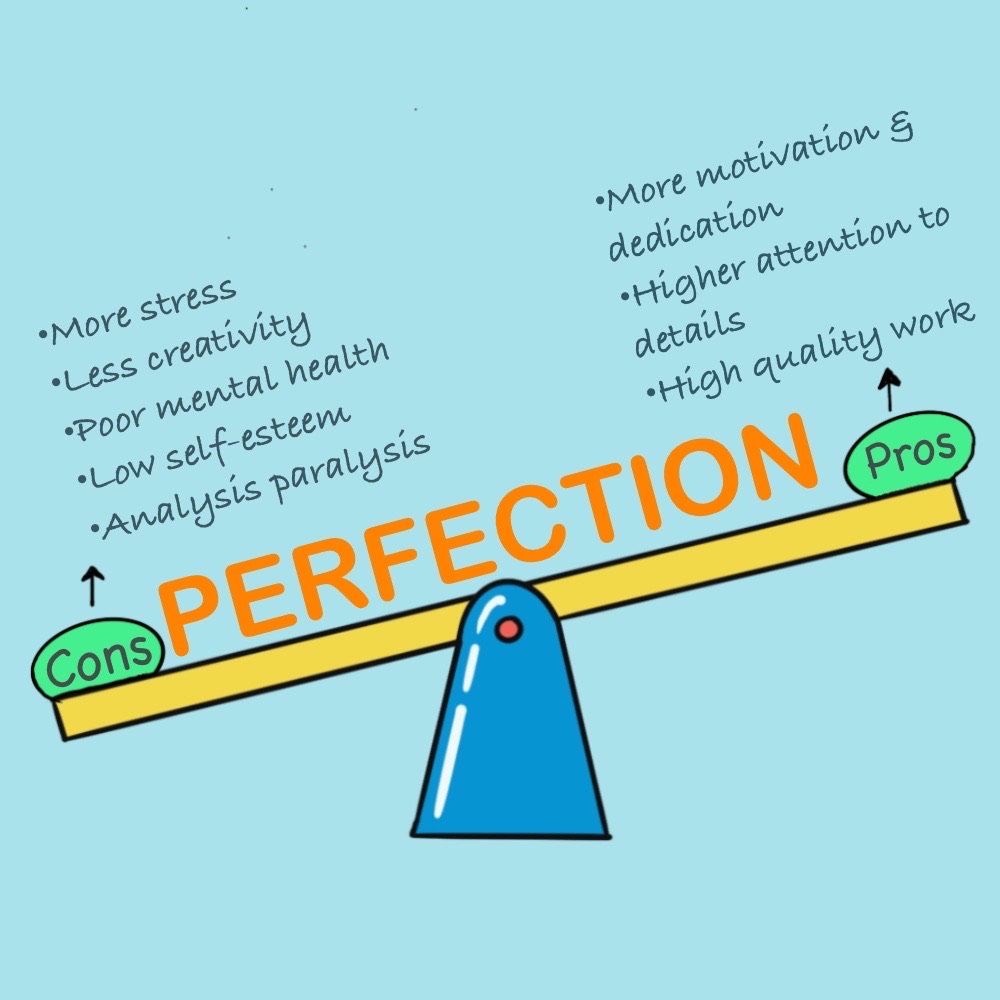Finding ways to improve the performance of tasks is not inherently wrong; However, more and more people are striving for perfection, not just improvement. When perfectionism becomes the new expectation, there can be numerous consequences.
What is Perfectionism?
Contrary to popular belief, perfectionism is not simply about being perfect— it’s the mindset and tendency to set unachievable goals and standards. Being a perfectionist ultimately leads to overly self-critical behavior when those unachievable goals are not reached.1
Perfectionism can be caused by intrinsic standards born out of social pressure. This pressure comes—unintentionally—from people in your community, such as parents and teachers expressing their desire to see you succeed or peers simply sharing their successes, which spurs the inner desire to be the best.
Perfectionism’s Effect on Mental Health
Some of the downsides of being a perfectionist include the following:
- More stress
- Less creativity
- Poor mental health
- Low self-esteem
- Analysis paralysis
Perfectionists experience more stress since they consistently strive to achieve unrealistic goals and often possess workaholic traits that can ultimately lead to burnout.
Since perfectionists typically avoid making mistakes at all costs, they also tend to be less creative, as creativity is designed as a learning process in which mistakes are frequently made.
While it is possible for perfectionism to feed creativity by attempting to find new, better ways to do something, most research claims the opposite.
Additionally, perfectionists tend to have lower self-esteem if they cannot meet the expectations of themselves or others, which can lead to other unhealthy mindsets and mental illnesses such as depression or anxiety.2
What is analysis paralysis?
Those who struggle with perfectionism often also struggle with decision-making since they wait to make a perfect decision, which is impossible. This is known as analysis paralysis.
Analysis paralysis is a common symptom of perfectionism. Analysis paralysis involves looking at or analyzing all options and wanting to make the best choice—which does not exist. When none of the options seem perfect, a perfectionist is stuck and cannot decide. This can be severely detrimental to productivity. Without the ability to make decisions, a lot less will be accomplished.
Analysis paralysis can also be tied to procrastination. Perfectionists tend to wait until they feel “ready” to accomplish a task so that it is done perfectly. However, they often find that they never achieve the feeling of readiness and keep putting the task off.

Is it all bad?
While there are many downsides to being a perfectionist, there are some benefits, including the following:
- More motivation and dedication: Perfectionists want to get stuff done and want it done well, so they will commit to accomplishing something perfectly.
- Greater attention to detail: Perfectionists want to ensure everything is done right, so they pay closer attention to detail.
- Complete higher quality work: Perfectionists, as the name suggests, strive for perfection so their work has fewer flaws.
Despite these benefits, the cons outweigh the pros. An unhealthy mindset is not worth improving the quality of your work.
Instead of “Perfect,” Strive for “Practical”
Don’t be afraid to make mistakes! Perfection is impossible. I work at a tutoring center, and one of the decorative motivational posters is a quote from Niels Bohr, a Nobel Prize-winning physicist: “An expert is a person who has made all the mistakes that can be made in a very narrow field.” Making mistakes is part of the learning process, and the fear of messing up can hinder intellectual growth. Accepting your mistakes and learning from them is vital to making progress.
Perfectionism tends to cause more problems than it solves. A healthier, more realistic goal is personal excellence. It can be beneficial to push yourself to improve, but mistakes are okay and a part of learning. If a goal seems unreachable, there is no shame in revising it into something achievable. Strive for excellence, not perfection.
Works Cited
- Brandt, Andrea. “The Dangers of Perfectionism.” Psychology Today. Sussex Publishers, April 1, 2019. https://www.psychologytoday.com/us/blog/mindful-anger/201904/the-dangers-perfectionism.
- “Module 1 What Is Perfectionism?” Centre for Clinical Interventions, March 2009. https://www.cci.health.wa.gov.au/~/media/CCI/Consumer-Modules/Perfectionism-in-Perspective/Perfectionism-in-Perspective—01—What-is-Perfectionism.pdf.






















